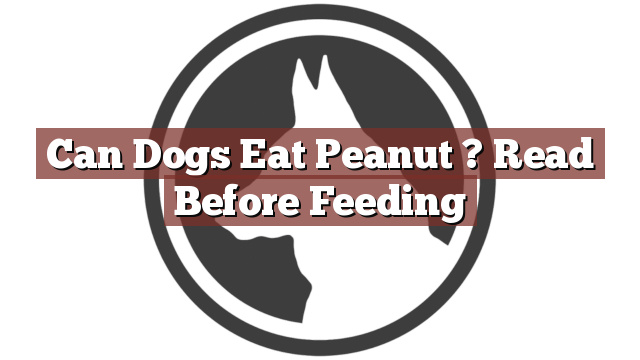Understanding Your Dog’s Dietary Needs
As a responsible pet owner, it’s crucial to understand and meet your dog’s dietary needs. A well-balanced diet plays a significant role in your furry friend’s overall health and well-being. While dogs primarily thrive on a diet high in protein, they can also benefit from certain fruits, vegetables, and even some nuts. However, it’s essential to be cautious and informed when introducing new foods into your dog’s diet.
Can Dogs Eat Peanut? Read Before Feeding
Can dogs eat peanuts? This is a common question among dog owners who may want to include peanuts in their pet’s diet. However, it’s important to note that while peanuts are generally safe for dogs to consume, there are some considerations to keep in mind. Yes, dogs can eat peanuts, but it’s crucial to do so in moderation and with the proper precautions.
Peanuts are an excellent source of protein, healthy fats, and essential vitamins and minerals. They can be a tasty and nutritious treat for your furry companion. However, it’s crucial to ensure that the peanuts are unsalted, unflavored, and free from any additives such as chocolate or sugary coatings, as these can be harmful to dogs. Additionally, some dogs may have allergies or sensitivities to peanuts, so it’s essential to monitor your dog’s reaction when introducing peanuts into their diet.
Pros and Cons of Feeding Peanuts to Dogs
Feeding peanuts to your dog can have both pros and cons. On the positive side, peanuts provide a good source of protein, which is essential for your dog’s muscle development and overall health. They also contain healthy fats, such as monounsaturated fats, which can contribute to a shiny coat and healthy skin. Peanuts also offer various vitamins and minerals, including vitamin E, niacin, and manganese.
However, there are a few cons to consider as well. Peanuts, like any nut, can be high in calories, so feeding them in excess can lead to weight gain and obesity in dogs. They can also pose a choking hazard, especially if given whole or in large pieces. Furthermore, some dogs may have difficulty digesting peanuts, leading to gastrointestinal issues such as vomiting or diarrhea.
Conclusion: Weighing the Benefits and Risks for Your Canine Companion
In conclusion, the answer to "can dogs eat peanuts?" is yes, but with caution and in moderation. While peanuts can offer some nutritional benefits for your furry friend, it’s important to consider the potential risks, such as allergies, choking hazards, and digestive issues. As with any new food, it’s always best to consult with your veterinarian before introducing peanuts or any other unfamiliar food into your dog’s diet. They can provide personalized advice based on your dog’s specific dietary needs and health conditions. By being informed and attentive to your dog’s well-being, you can ensure that their diet is balanced, healthy, and enjoyable.
Thank you for taking the time to read through our exploration of [page_title]. As every dog lover knows, our furry friends have unique dietary needs and responses, often varying from one canine to another. This is why it's paramount to approach any changes in their diet with caution and knowledge.
Before introducing any new treats or making alterations to your dog's diet based on our insights, it's crucial to consult with a veterinarian about [page_title]. Their expertise ensures that the choices you make are well-suited to your particular pet's health and well-being.
Even seemingly harmless foods can sometimes lead to allergic reactions or digestive issues, which is why monitoring your dog after introducing any new food item is essential.
The content provided here on [page_title] is crafted with care, thorough research, and a genuine love for dogs. Nevertheless, it serves as a general guideline and should not be considered a substitute for professional veterinary advice.
Always prioritize the expert insights of your veterinarian, and remember that the health and happiness of your furry companion come first.
May your journey with your pet continue to be filled with joy, love, and safe culinary adventures. Happy reading, and even happier snacking for your canine friend!

